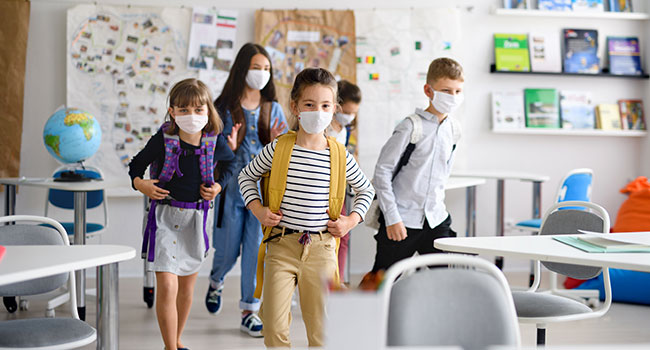
Experts Weigh In: How to Reopen Schools Safely
- By Diane Schaffhauser
- June 29, 2020
Children will be in the first wave of people to come out of stay-home orders put in place to respond to coronavirus. That's the only way their parents and other caregivers will be able to get back to work themselves. To make sure their return to school is safe, a team of clinicians, scientists and educators has examined the issues involved in helping schools prevent the spread of COVID-19. Among the essentials that will be required: "large-scale" viral testing in students, appropriate communications and robust contact tracing.
"Re-Opening Schools Safely: The Case for Collaboration, Constructive Disruption of Pre-COVID Expectations, and Creative Solutions" will be published shortly in The Journal of Pediatrics. (Until then, a proof copy is available online.)
As the journal article pointed out, a return to in-person school is complex. Planning for reopening must be "more deliberate" than the closing was, "delineating precisely how, when, under what conditions, and base the reopening on available data."
Among the many complexities:
How will children who have conditions that involve "productive coughing" (such as cystic fibrosis or asthma) be treated with fairness?
How will schools deal with the "generally inadequate allocation" of school nurses?
How do schools curtail physical contact while still enabling students to have physical education and after-school activities?
How will districts cope with the ethical and privacy issues inherent in "viral surveillance and contact tracing"? For example, what happens if a student's family doesn't give consent to participate?
And how will schools deal with the concerns and stress among school staff that could "exacerbate already high rates of teacher turnover that disproportionately affect students attending under-resourced schools"?
Although severe COVID-19 is uncommon in children, the article noted, more community-based data is needed to determine whether most children avoid infection, or if infected, largely are asymptomatic. Therefore, "large-scale viral nucleic acid and serological testing in children is needed to guide safe school reopening," the experts asserted. That in turn will require non-traditional testing sites such as homes, schools and "child-friendly" self-collection methods.
The authors also called for the expansion of school-based health centers as schools reopen and a review and adjustment of programs such as federally assisted school-based meal plans "to meet the unprecedented circumstances" of a seemingly ever-growing rate of unemployment among parents and caregivers.
"The community at large will need to view schools as 'healthy places' for children and society," the article explained. "This could be accomplished by building public health-focused collaboratives capable of continuous learning and rapid cycles of implementation, as COVID-19 information evolves at breakneck speed. Otherwise, we risk further compounding the incalculable damage already incurred by COVID-19 among children across our country and the world."
Dan Cooper, a University of California at Irvine professor of pediatrics, co-wrote the article with Lisa Guay-Woodford from the Children's National Research Institute at George Washington University School of Medicine and Health Sciences, with contributions from 15 other experts.